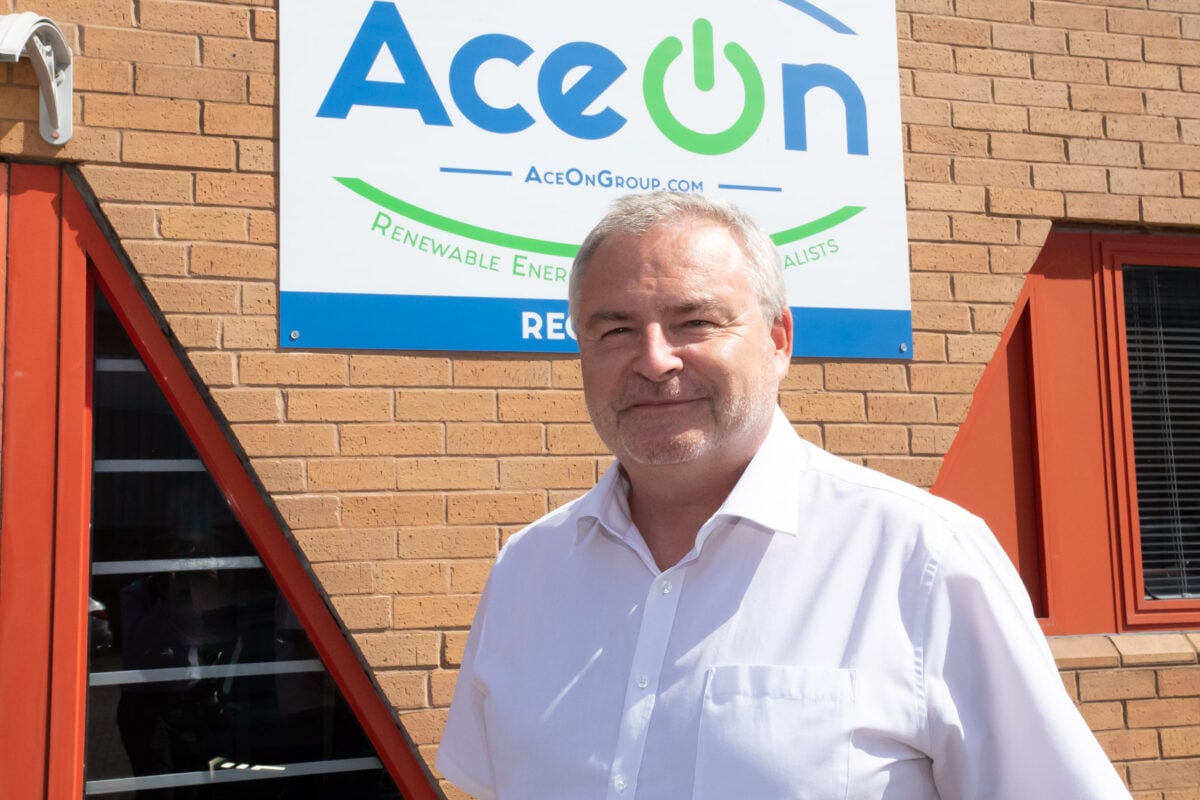
Richard Partington, managing director of AceOn Energy. Image: AceOn.
The benefits of solar and storage for reducing energy bills are well established, and with them the potential for the technologies to help those most vulnerable in society. Yet, projects to rollout the technologies to social housing have often hit speedbumps.
In March, energy supplier Rebel Energy and renewable technology company AceOn announced that they had teamed up to install solar and battery storage systems in social and affordable homes.
Solar Power Portal caught up with Richard Partington, managing director of AceOn Energy to discuss the companies social housing business model, it's new battery and why now is the perfect time to rollout solar and storage.
What are the key advantages to rolling out solar and storage now?
I believe the time for solar and storage is now. We face a climate emergency – that is pretty well understood – but the time for talk has passed. We are at a tipping point and we need to decarbonise our homes, businesses, offices and transport now.
The UK Government’s Statutory Net Zero Carbon Target by 2050 is challenging and most local authorities have set their Climate Action Plans and targets. Added to this, we are seeing new legislation and regulations for new-builds and social housing to improve their energy efficiency and increase renewables. But also fuel poverty has been a national concern for many years and this is being exacerbated by a cost of living crisis with soaring energy bills for households and businesses across the country. It's time to act.
With solar PV alone, on average 28-30% of solar energy can be consumed within a home directly. But that figure rises to 60-70% on average by adding energy storage. Plus, you can significantly reduce the amount of electricity that needs to be purchased from the grid.
For AceOn, are there any particular benefits to offering your technology through a partnership like that with Rebel Energy?
Helping to decarbonise the nation’s social housing stock is a key challenge and we hope that by teaming up with Rebel Energy, we can make their decisions to invest in solar PV, batteries and other renewable technology a little easier.
Based on our experience of working with customers in this sector to date, we have designed a new battery – the AceOn2.6 – specifically for the social housing sector. At the moment, costs and paybacks are a huge barrier to installing renewables, but by offering our technology in such an attractive and affordable proposition, it will increase interest and uptake significantly.
It’s worth mentioning that this tech will also be suitable for private householders and private landlords too – everyone is being stretched by the cost of living crisis and the soaring costs of energy in particular. This partnership has benefits for all.
What are the core challenges with rolling out a solar and storage offering for social housing?
There is always a major challenge for social housing providers in finding the considerable amounts of money needed to invest in improving and upgrading their housing stock – and financial pressures for everyone only seem to get more difficult. Our aim is to deliver the technology at an affordable price point while also turning this spend into an on-going revenue stream that can be used to support other housing services and the operation of the housing provider overall.
So, our AceOn2.6 storage solution is flexible in terms of wall or floor mounted so it can be fitted easily in different homes; it’s IP65 rated which further increases siting options; it is installer-friendly (plug and play design, lightweight, easy to handle); it’s adaptable as batteries can be installed in parallel to increase storage capacity; and it all comes with a market-leading warranty for peace of mind.
Tenant engagement is also crucial in the rollout and installation of energy efficiency and renewable technology in social housing accommodation. We want them to understand, see and feel the benefits.
Other companies and organisations seem to have looked at this in the past, why do you think AceOn and Rebel Energy’s offering will succeed where others have struggled?
AceOn is, I would say, fairly unique within the renewables sector as we have a combination of experience gained across the public and private sectors and an in-depth knowledge of the battery storage and renewable energy sectors. I think this is reflected in our national positioning where we have been chosen as the national Approved Partner/Supplier of both the Association of Public Service Excellence (APSE Energy) and the National Housing Federation for domestic energy storage.
We take nothing for granted. Our aim is to offer the best products and services we can and to work as positive partners to social housing providers and their tenants. Our approach is very much collaborative. The timing feels right in terms of Climate Change; the greater need for energy independence and security with the UK as well as the increasing costs of living and energy prices.
We feel that we’re offering a solution that has many wins for housing landlords and their tenants, for the local community and economy too. We will only succeed if we achieve those wins.
What’s the next step for the rollout?
Firstly, we want as many social housing providers as possible to know about our model and the benefits that it can provide.
We have already launched the model at the Association for Public Service Excellence’s Big Energy Summit on 9 March and we now have one-to-one discussions in place with a number of councils and housing associations who see the potential of what we are offering. We are hopeful that some big announcements will be made in early Summer around our early adopters.
I can’t stress enough though that there’s a lot of flexibility in how we can run this model and we are very much open to creating a bespoke model that would work for any social housing provider and their tenants.

